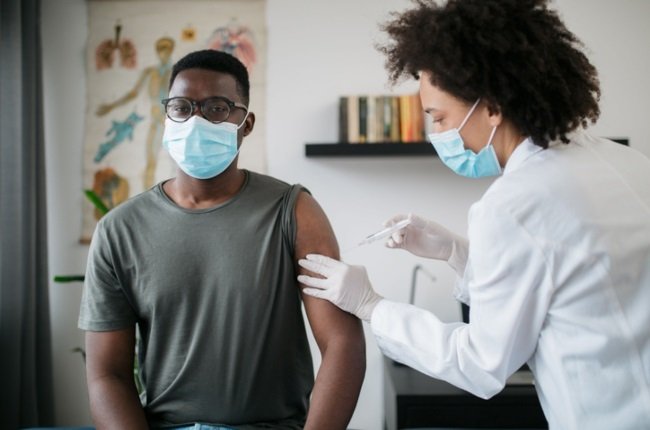Almost 65% of those vaccinated in the Eastern Cape- including our district – are women. This is an unusual pattern. In countries where vaccine uptake is recorded by sex, there is a slight trend towards men being more likely to get vaccinated than women. So, why are South African men more reluctant to get vaccinated for COVID-19? LOYISO DYONGMAN investigates.
Mohamed Docrat, head of the Department of Health in the Makana Municipality, says men’s reluctance to get jabbed is not new.
“Men, in general, do not seek medical help. Whether it’s an annual check-up for chronic disease or getting tested for HIV or going to clinics with their partners in the event of a sexually transmitted disease, men all over the country have been hesitant,” Docrat says.
I interviewed men in different parts of the Makana Municipality about Covid-19 vaccinations to hear from the stallions’ mouths.
In Joza, Sonwabile Saki, 43, said he has not yet gone for the vaccination. “I’m still undecided whether to go or not. I don’t have a problem with people talking about the side effects of the vaccine. My main problem is that I’m scared of injections. That is not something new, I grew up like that, and it would have been better if people were being given pills instead of this jab,” Saki said.
Bulelani Mayekiso, 38, from Fingo Village, said he went for the first jab but now is afraid of going there again. “I didn’t have any side effects, but I am scared when I look into the needles.
“I noticed that there were very few males when I went there at the BB Zondani vaccination centre last month. I don’t know; maybe injections are meant for women. They are not scared, and you can see even there while they waiting for the jab. They are not nervous or showing any signs of being scared,” said Mayekiso.
Jonathan Visagie, 51, from Scott’s Farm, said his wife forced him to get vaccinated in early August. “I had no choice because we are family here and have kids. My wife told me that I have to be vaccinated too. We have now both been vaccinated, and I feel relieved,” said Visagie.
His wife, Rosy Visagie, 50, said staying with someone not vaccinated is a great risk. “I pulled him by hand to come with me to take the jab. I don’t understand why men are so reluctant to take the jab. It is not painful, and even two minutes and you’re done,” said Visagie.
Siyabulela Mata, 34 and from Riebeek East, about 42 kilometres from Makhanda, said he would not take the jab. “No, I’m not going take the vaccination. I’m feeling good and don’t see a reason for that. People are talking of side effects, and some who have been there are saying you don’t feel well after taking the vaccination,” said Mata.
Mohammed Masum, 32, originally from Pakistan and running a spaza shop in Vukani, said he took the jab. “I was not that much scared and just went there and got the vaccination. I have family back home and don’t want to die and leave them behind as this Covid-19 is dangerous. Maybe the government should go out and encourage males to get vaccinated,” said Masum.
Docrat agrees. He says the Health Department needs to develop a smart strategy to get men “aboard the vaccination train”.
“There are serious consequences for not vaccinating – especially for older men over sixty age group. They are a very high-risk group in terms of severe illness and even death due to covid infection. Being vaccinated reduces the risk of severe diseases and death,” said Docrat.
Andrew Gibbs, a specialist in the Gender and Health Research Unit of the South African Medical Research Council, writes in The Conservation that while there is currently no research on why fewer men get the vaccine, it’s possible to gain some insights by looking at research into men’s attitudes to HIV testing and engaging with the health system.
Interestingly, there is no evidence that vaccine hesitancy is more common among men than among women in South Africa. A recent National Income Dynamics Survey showed that men and women were equally willing to get vaccinated.
So why the pattern when it comes to the COVID-19 vaccine?
Gibbs writes that much of the research on why men may not seek HIV testing and treatment has focused on masculinity. Masculinity refers to the norms around “what it means to be a man” in a given time and space.
“Economic, social and political forces shape these norms, and they influence men’s health behaviours, including vaccination. Research has suggested that men feel testing and treatment for HIV is a threat to their masculinity. They think it will change how others will see them and how they will see themselves. Men are also concerned about whether treatment will affect things that are important to them, including drinking alcohol, having sex, and fathering a child,” Gibbs writes.
Other research has highlighted how men feel about ill-health in general. It is a sign of vulnerability, and often masculinity means not showing vulnerability. All these factors could be behind men’s hesitancy to get the COVID-19 vaccine, Gibbs speculates.
Another barrier to HIV testing and treatment for men is seeing the South African health system as a space for women. They feel it does not accommodate the daily lives of men. Men have described clinics as spaces for women to get contraception and healthcare for children, Gibbs writes.
Together with a fear of needles and the potential side effects of the jab, these factors seem to be driving low vaccination rates for men.
It is time to engage Makhanda’s men!


